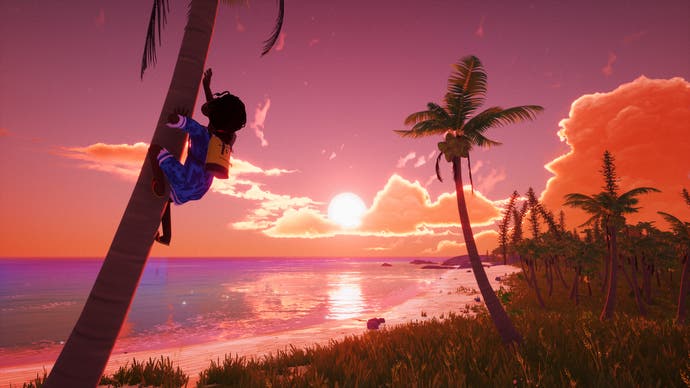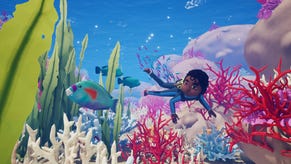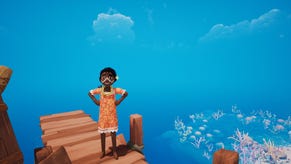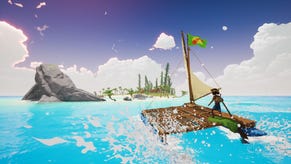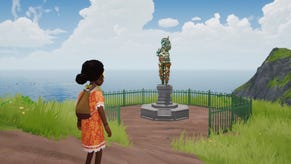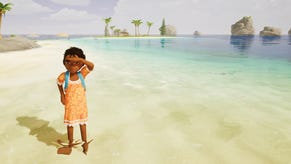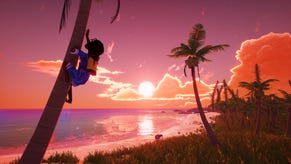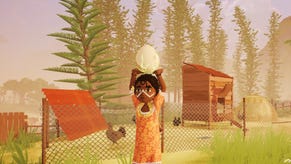Tchia review - an archipelago of delights and horrors
Like a rolling stone.
Not bragging, but on our street, today is bin day, and I celebrated by standing for ten minutes or so at the bedroom window while a stray yogurt carton ran up and down the path outside our house. It sounds a bit American Beauty, I know, but actually it was a brisk delight. The wind properly animated this yogurt carton, finding a real comic character for it as it batted back and forth along the paving. To be honest, it was a bit of a wrench to leave it and do the school run.
How Tchia, I thought afterwards. Tchia is one of those games that lives on in the memory after you're done with it. The things that don't quite work fade and the things that no other game does quite the same way only grow brighter. Tchia's a game about exploring an archipelago in the southwest Pacific: you're cast as a child and the world around you is absolutely huge as it rushes off in every direction. But you have this power that allows you to get a grip on it. You can "soul jump" into nearby animals and certain objects, racing over the earth as a deer, swooping under the clouds as a pigeon, tumbling along as a lantern or a rock. Animated by movement! The yogurt carton would be right at home.
Soul jumping is absolutely the best thing about Tchia. It's fun to find out what you can do as a shark that you can't do as a crab, and it's nice to get a weird kind of revenge on a mountain climb that has been defeating you by just hopping into a nearby bird and riding high over the terrain that had been such a pain moments before. Soul jumping ties into what passes for combat here - you can jump into a lantern to set the game's rag-based enemies on fire and destroy their camps, and you can fling rocks about - but as you soul jump in and out of objects, held back only by an extendable pool of soul jump mana, you can chain it together with the game's other traversal elements too.
And they're brilliant as well. A lot of them are straight up pinched from Breath of the Wild: you can climb any surface or glide from a height as long as your stamina gauge lasts, and, as with Zelda, you can even drag out your stamina when gliding with the occasional judicious plummet. But there are lovely wrinkles added everywhere. Tchia's raft requires you to move between setting the sail and using the steering pole thing (I am not much of a mariner), while trees - oh god, the trees here. Climb to the top and you can swing them back and forth and then fling yourself forward into space to get a real boost in speed and distance. It's how a kid thinks trees work. And hopefully you can see what happens next - fling and then soul jump, fling and then glide, fling and then limpet yourself to a mountain surface and climb! Climb climb climb. It's a treat.
Tchia's archipelago is quietly designed around these skills of yours. Because you can dive, the seabed is alive with pastel coral and clamshells fat with pearls waiting to be pinched. Because you can fling yourself from one tree to the next, there are forests of all different kinds of density, including some lovely marshy spots. Because you can climb, the islands have a generous spine of humped mountain running through their heartlands, like the ridged backs of sleeping dinosaurs. There are villages with huts to hop from, industrial areas, and a decent-sized city. If you're after a sense of the scale, a confusing - sorry - comparison with Just Cause 2 might be useful. It's not as big as Just Cause 2 in any way, but given the size of its child protagonist, Tchia has that same Just Cause 2 sense of being really quite surprisingly vast. A couple of great islands and a lovely stretch of water around them. There's much more territory here than you might expect.
So what do you do here? I'm going to divide these things in two, even though in the game you should never do that, and absolutely let things flow together in a wonderful tapestry of foolish whims and passing distractions. The first thing: Tchia has much more of a story than I was expecting, and it's not remotely the kind of story I was imagining. I saw the art and played a gentle demo and thought I was in for something a bit like A Short Hike: a playful exploration of landscape and its pleasures, threaded along a gentle narrative. Instead, this is pretty intense stuff. Kidnappings! Mythical gods! People getting knives in the face (srsly)! Children getting eaten!
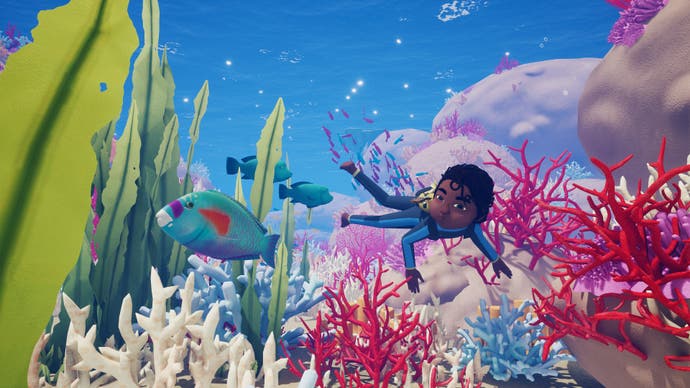
What this amounts to is a series of missions running through the game that can sometimes feel a bit like you've been dropped into Far Cry. At one point latish in proceedings I was scoping out some industrial terrain with my camera, prior to working my way in and smashing everything up and A Short Hike felt very distant indeed. Far Cry? There's that same range of approaches that defines Ubisoft's series, that same willingness to let you try something rash and live with the consequences. No guns or getaway cars, sure, but you can soul jump, so that means rocks, exploding rocks, lanterns and fire propagation, and then hopping a pigeon to give yourself some distance.
Not all of the missions are like that, and variety is actually one of Tchia's many strengths. But they're all - to me at least - surprisingly intense. You're dealing with things that really matter, and working through a storyline that is not afraid to lurch from one horror to the next. My daughter's nine, and I'm not sure I would let her see a couple of specific cut-scenes here.
Meanwhile, the islands! The archipelago! The rocks to embody, the trees to swoop between, the mountains to climb. Tchia's islands are an absolute riot of Ubisoft busy-ness, from various doodads to collect, fruit that boosts your stamina, challenge rooms, unlocked by a carving minigame, that boost your soul jump mana, and all sorts of other things. Climb the game's equivalent of an Assassin's Eagle Tower and the map populates with all sorts of stuff. Places to have dinner. Harbours to unlock fast travel. Pearls to pluck from their cases. Enemy camps to explode.
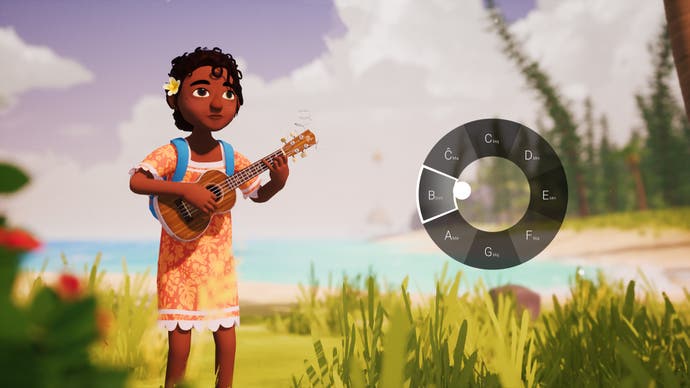
A lot of this really is just stuff to do, and remember, this is all meant to be swept together with the narrative stuff, stitched into enjoyable shape as you soul jump, glide, raft back and forth across the game world. Some of it is properly inspired, though. I loved playing music. I loved the treasure maps I was given that encouraged me to look for clues in the world itself. I loved the fact that, for the most part, the game's map would only give me a general sense, a jazz sense, of where I actually was. I loved rocking up at a new location and having dinner before sleeping at a campfire.
And that dinner thing is important, I think. It gets at the special charm of Tchia. I have never been to New Caledonia, but Tchia is an absolute immersion in a culture that I gather is deeply inspired by it. The songs, the languages, the art, the way people live and the things they value. And the things they eat. Someone smart once told me that The Odyssey is really a story about how people are greeted. Odysseus goes from island to island and sees how they treat strangers. Bit reductive, I sense, but there's a bit of this in Tchia: you move through the world and then you have lunch when you settle down. You even make the food in certain cases and find the ingredients. But the game always focuses on the plate, on the kinds of food and the human warmth of it and what it all means.
This is what I will carry away with me, I think, along with great moments where I climbed over the ridge of a huge mountain, of moments at sea where the watercolour clouds were piled overhead in massive tumbling anvils, of moments where I was gliding along to do a dangerous story mission and saw something glinting in a marsh that I absolutely had to explore. Written like this, I see that Tchia isn't just a game about a child, it's a game with a child's eagerness to find meaning and interest in a wide, wide range of things. And end each busy day with a nice dinner, of course. Brilliant.
